Introduction
In the contemporary corporate landscape, the role of a Microsoft Teams Specialist has become increasingly vital as organizations strive to optimize their digital communication and collaboration strategies. These professionals are not merely users of the platform; they are the architects of an efficient and seamless working environment, tasked with:
- Configuring settings
- Training users
- Integrating Teams with existing systems
As the demand for remote collaboration tools surges, underscored by staggering statistics on user engagement and productivity, the expertise of Microsoft Teams Specialists is essential in harnessing the platform’s full potential. This article delves into the multifaceted responsibilities, essential skills, and significant career advancement opportunities available within this dynamic field, highlighting the indispensable contribution of these specialists to organizational success in an ever-evolving work environment.
Defining the Role of a Microsoft Teams Specialist
A specialist in the platform is essential for the effective implementation and enhancement of the service within an organization. This professional is assigned a diverse range of responsibilities, including:
- Configuration
- User training
- Seamless integration with other business applications
Their role is vital in fostering effective communication and collaboration, which ultimately enhances productivity and streamlines workflows in the evolving digital workspace.
According to a survey conducted by the company, 90% of large enterprises utilizing the platform for telephony will be employing direct routing for PSTN connectivity by the end of 2020, highlighting its increasing significance. Given the remarkable growth of Teams—evidenced by approximately 27.4 million downloads in Europe, the Middle East, and Africa between Q1 2020 and Q4 2023—the necessity for skilled specialists is underscored. Furthermore, with the collaboration platform generating over $8 billion in revenue in 2023, as highlighted by a case study on its revenue generation, the effect of well-executed management is substantial.
The expertise of a specialist in collaboration tools not only facilitates troubleshooting and the application of best practices but also guarantees that the system aligns strategically with organizational objectives, maximizing its potential as a driver of productivity and cooperation.
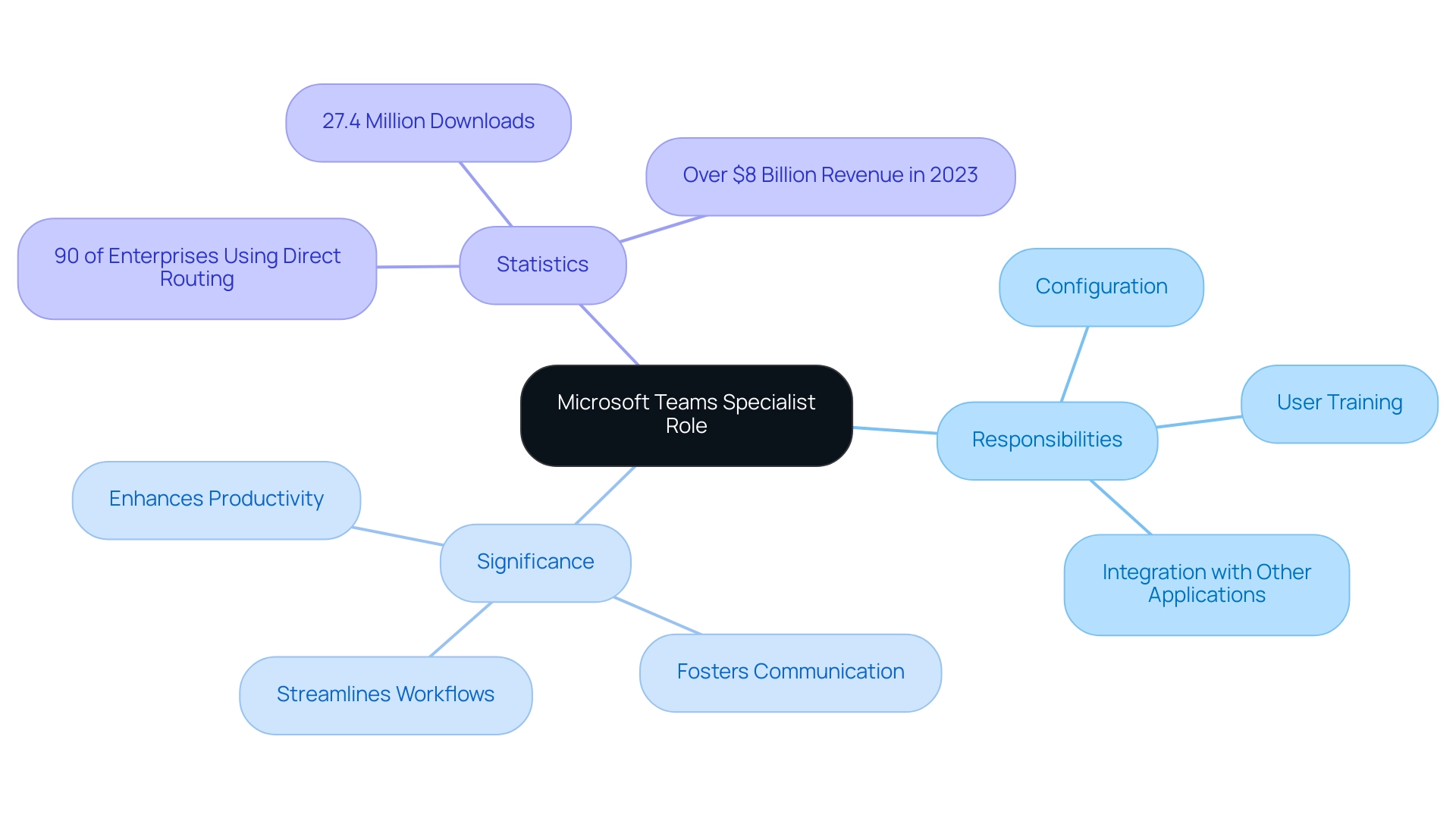
Key Responsibilities of a Microsoft Teams Specialist
The role of a Microsoft Teams specialist encompasses several key duties that are vital for enhancing the platform's effectiveness within an organization. These responsibilities encompass:
- Configuring and managing settings tailored to meet specific organizational needs;
- Training and providing ongoing support to users to maximize their utilization of the platform;
- Collaborating with IT and other departments to ensure seamless integration with existing systems;
- Monitoring usage and performance metrics to identify opportunities for enhancement;
- Developing and implementing best practices for effective communication and collaboration, which includes intentional actions such as starting chats, placing calls, sharing files, and participating in meetings;
- Troubleshooting technical issues and delivering timely solutions.
A notable case study highlights the Estimated Bandwidth Impact on Audio Quality, indicating that bandwidth values during a test call are critical for audio quality in Microsoft’s platform; specifically, bandwidth below 100Kbps leads to degraded call quality, especially for video calls.
Monitoring and maintaining bandwidth within recommended guidelines is vital for ensuring high-quality audio and video calls. Additionally, with the increase in remote work, shown by a collaboration platform recording 4.1 billion meeting minutes in a single day in April 2020, these responsibilities have become even more critical. Additionally, it's noteworthy that in 2017, the collaboration platform generated $0.01 billion in revenue, showcasing its financial significance and growth in the industry.
Naveen Kumar, a data and statistical expert, emphasizes that with a strong foundation in data analysis, transforming complex statistics into actionable insights is vital for enhancing user engagement across diverse industries. By fulfilling these responsibilities, the Microsoft Teams specialist ensures that the system not only operates efficiently but also effectively supports the overarching goals of the organization.
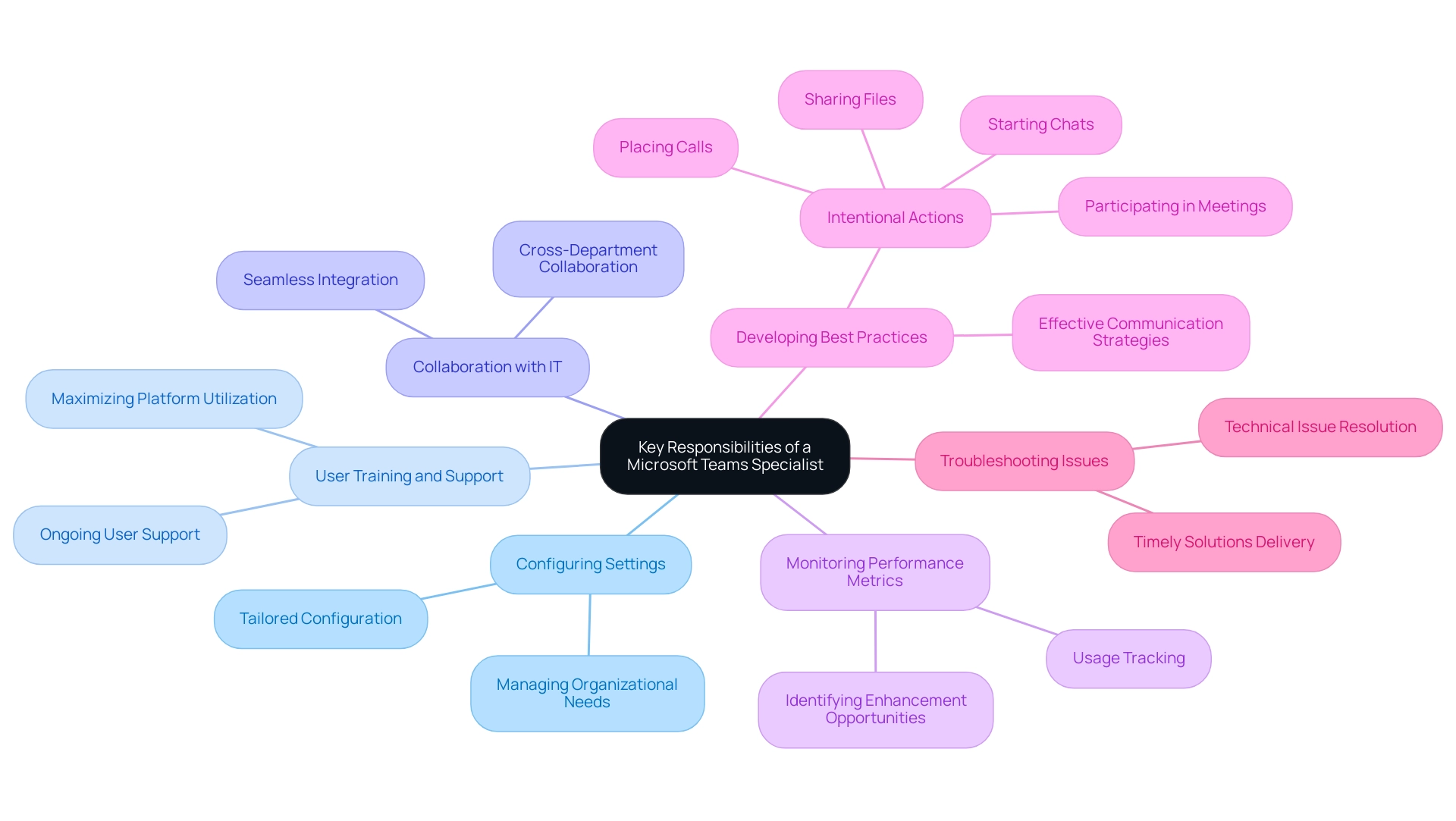
Essential Skills and Qualifications for Success
To excel as a Microsoft Teams specialist, individuals must possess a comprehensive set of essential skills and qualifications. These include:
- Proficiency in collaboration software and its integrated tools, such as SharePoint and OneDrive
- Strong technical troubleshooting abilities to resolve client issues promptly
- Excellent communication and interpersonal skills to enhance collaboration
- Experience in project and change management to implement effective solutions
- An understanding of organizational dynamics and client needs to tailor experiences effectively
- Relevant certifications, such as the Certified: Collaboration Software Administrator Associate, which validate expertise in the platform
Additionally, proficiency in Office skills remains crucial for data analysis, document creation, and professional communication, as these skills enhance the overall effectiveness of a Microsoft Teams Specialist.
The integration of emotional intelligence (EI) assessments in hiring processes underscores the importance of combining technical prowess with interpersonal skills. Chevas Balloun wisely states,
Whether you're starting your career or looking to level up, investing time in mastering these tools is definitely worth it - they're not just nice-to-have anymore, but essential for staying competitive in today's job market.
Furthermore, statistics indicate that AI power individuals save an average of 30 minutes a day, highlighting the efficiency gains that come with mastering these tools.
By utilizing resources from a major technology company, including official documentation, video tutorials, and community forums, a Microsoft Teams specialist can enhance their knowledge and adapt to the evolving demands of the workplace, ensuring that they are well-equipped to manage the platform and assist individuals effectively in a dynamic environment. Access to these expert resources enhances the learning experience for Office users, providing ongoing support as they develop their skills.
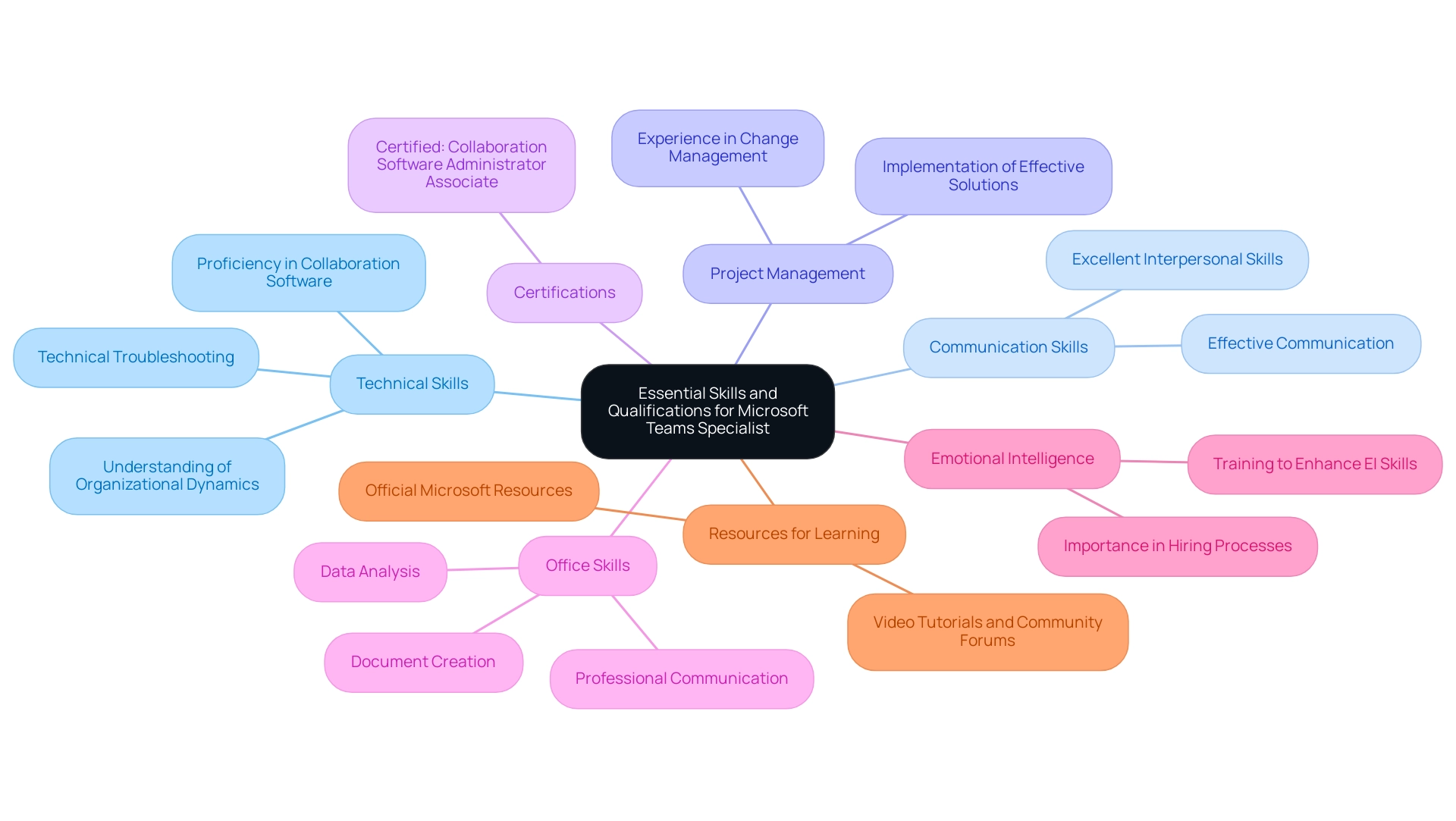
The Significance of Microsoft Teams in Today's Work Environment
The software has emerged as an essential tool for organizations navigating the complexities of remote work. By integrating chat, video conferencing, and file sharing capabilities, it fosters seamless communication among team members, irrespective of their geographical locations. This is particularly relevant in today's dynamic work environment, where agility and adaptability are paramount.
A notable trend observed is the significant rise in usage of the collaboration platform on Fridays, which the company notes underscores its role in assisting groups in completing weekly tasks and preparing for future challenges. This trend is vital for maintaining productivity as teams close out the week and prepare for the next. Additionally, data shows that 58% of employees would contemplate pursuing new job opportunities if remote work ceased to be available, emphasizing the essential requirement for efficient remote collaboration tools to boost employee engagement and retention.
The system's ability to enhance organizational productivity is further supported by a recent survey from Indeed, which revealed that 37% of remote workers are concerned about visibility and interaction with leadership, leading to feelings of isolation. This demonstrates the significance of utilizing platforms such as collaborative software to improve employee acknowledgment and connection in virtual environments, tackling these visibility issues. As organizations increasingly adopt Microsoft Teams, the role of the Microsoft Teams specialist becomes crucial in ensuring it is utilized to its fullest potential, driving both collaboration and success in remote work environments.
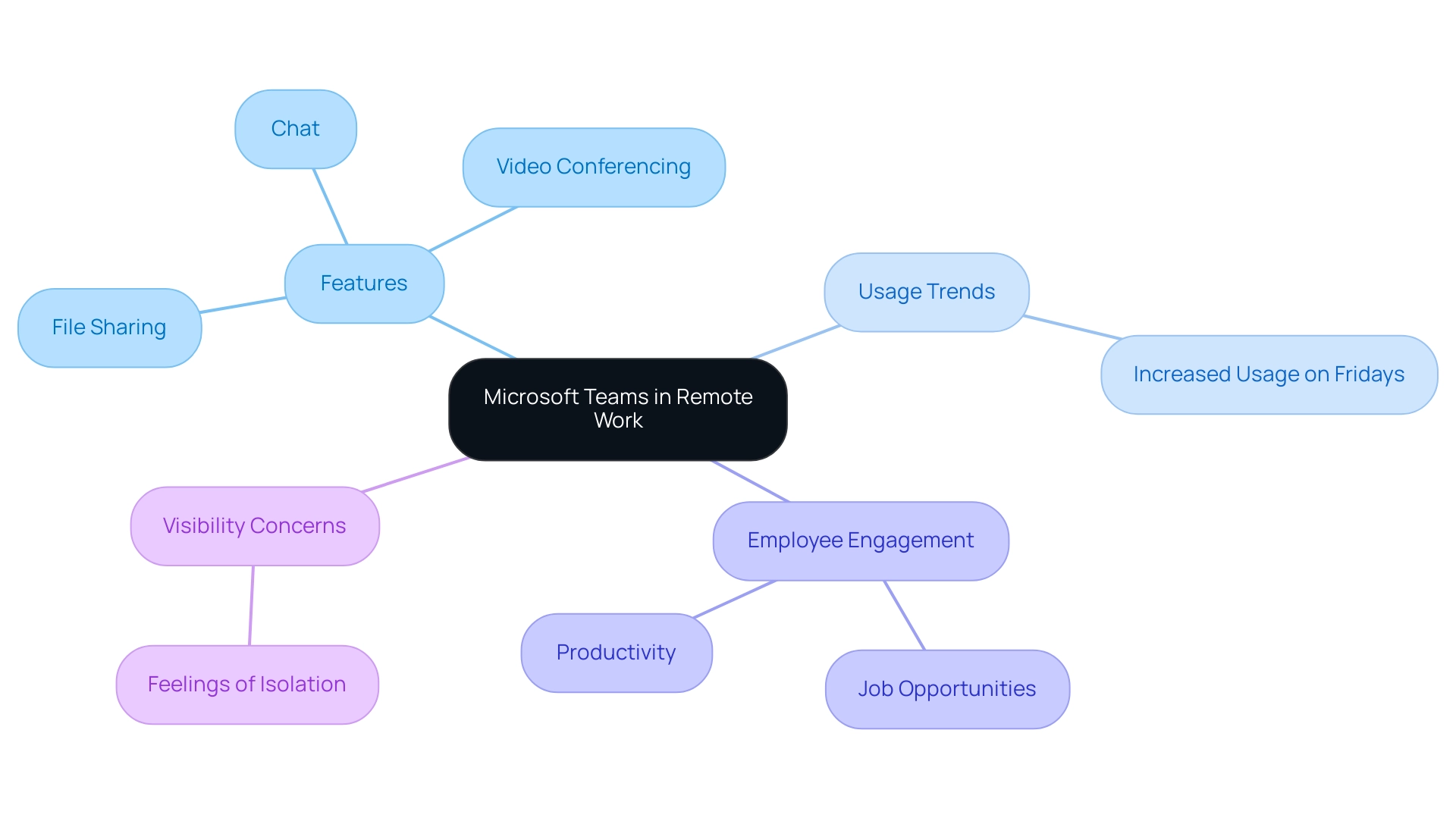
Career Advancement Opportunities for Microsoft Teams Specialists
The environment for collaboration is flourishing for Microsoft Teams specialists, fueled by organizations placing greater emphasis on efficient collaboration tools. Companies using AI and automation have saved an average of $3 million more than those that did not, highlighting the financial benefits of adopting advanced technologies in collaboration tools. As a result, there are numerous career advancement opportunities within this domain.
Specialists can transition into roles such as:
- Technology Consultant
- IT Project Manager
- Chief Technology Officer (CTO)
depending on their skills and professional aspirations. The software holds 32.29% of the global video conferencing market share, highlighting the platform's importance and relevance in the industry. Continuous professional development, including obtaining relevant certifications, is crucial for enhancing career trajectories.
Moreover, with the continuous incorporation of advanced technologies, there are growing opportunities for a Microsoft Teams specialist to focus on niche areas such as AI integration and data analytics within the platform. This evolution not only broadens their career prospects but also positions them at the forefront of technological advancements, ensuring their relevance in the job market. The increasing reliance on collaborative tools underscores the critical role of a Microsoft Teams specialist in shaping organizational success.
Additionally, 43% of IT leaders have indicated that they require continuous administrative overhead to maintain security, emphasizing the importance of ongoing learning and adaptation in the role of Microsoft Teams Specialists.
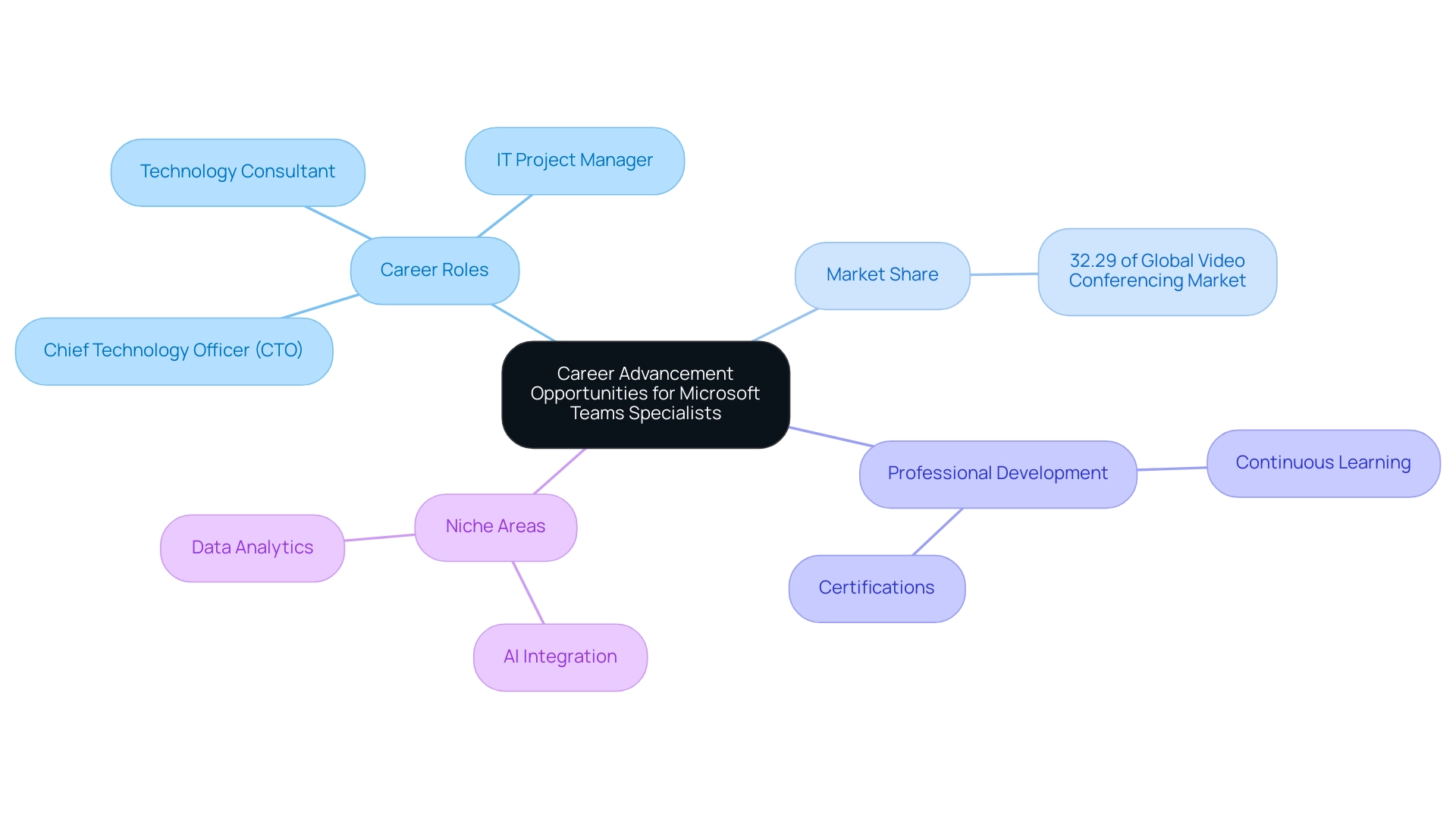
Conclusion
The role of a Microsoft Teams Specialist is pivotal in navigating the complexities of modern workplace communication and collaboration. As organizations increasingly rely on digital platforms to enhance productivity, these specialists are not only responsible for configuring and managing the Microsoft Teams environment but also for empowering users through effective training and support. Their expertise ensures that the platform is seamlessly integrated with existing systems, fostering a collaborative culture that transcends geographical boundaries.
In addition to their technical responsibilities, Microsoft Teams Specialists must possess a diverse skill set, including:
- Strong troubleshooting abilities
- Project management experience
- A deep understanding of user needs
As highlighted, the significance of emotional intelligence cannot be overlooked, as it plays a crucial role in fostering teamwork and enhancing user engagement. The demand for these specialists is further amplified by the growing reliance on remote work solutions, making their role indispensable in maintaining organizational productivity and morale.
Moreover, the career prospects for Microsoft Teams Specialists are promising, with opportunities for advancement into various high-level positions. As the market for collaborative tools continues to expand, specialists equipped with relevant certifications and a commitment to continuous learning will find themselves well-positioned to lead in this dynamic field. Ultimately, the contributions of Microsoft Teams Specialists are essential in harnessing the full potential of digital collaboration tools, driving organizational success in an increasingly interconnected world.




